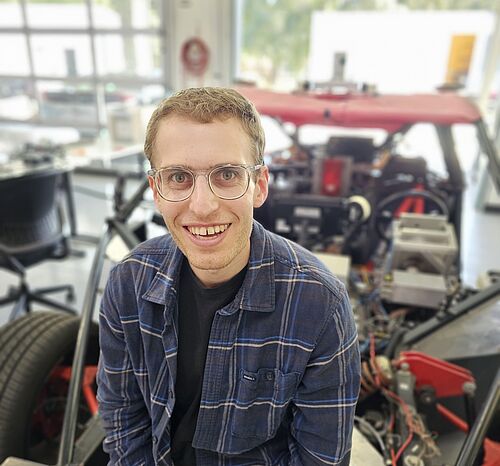About Daiki
Daiki Mori received his MS. In Mechanical engineering from Keio University in 2016. He then joined Toyota Central R&D Labs. Inc. and worked on vehicle dynamics and state estimation research and development for Lexus Advanced Drive system (hands-off level-2 system) which was launched in 2020. He is currently a visiting scholar at the Dynamic Design lab. at Stanford University from 2022. His research focuses on integrating AI approaches with physical knowledge to control the vehicle at the limits of its performance. The algorithm ultimately led to modelling both racing and drifting for a tandem drift project. He is currently interested in the approaches to safely deploying AI based vehicle control algorithms to enhance safety.
Daiki about his time at our institute
I had the privilege of joining the institute as a visiting researcher for five weeks. My main goal was to engage in as many discussions as possible to learn from the institute about the safety in autonomous vehicles. My research specifically focused on how AI vehicle controllers could be deployed in consumer vehicles. AI is known to be a black-box algorithm that makes it one of the most difficult algorithms to be used for safety. The insightful discussions at the institute provided valuable guidance on how to approach this topic. In addition, in collaboration with the institute members, we implemented an MPC vehicle controller to the Stadtpilot vehicle (HuViL). My time there was not only highly productive but also genuinely enjoyable, thanks to the institute’s warm, kind, and thoughtful community.

About Agapius
Agapius Bou Ghosn received his B.E. in Mechatronics Engineering from the Lebanese American University in 2019. He received his Ph.D. in Real-time informatics, robotics and control in 2023 from Mines Paris. His thesis focused on advancing the field of autonomous vehicles by integrating learning techniques into vehicle observers and planners. His work targeted the accurate representation of the complex dynamics of vehicles and was demonstrated through both simulated and real-world experiments. After his thesis, he joined Renault Group to pilot the development and validation of ADAS features into their vehicles.
Agapius About His Time at Our Institute
The goal of my mission at TU Braunschweig was to use the standard in-car sensors of the Stadtpilot vehicle to provide estimates as close as possible to a high-precision iTraceRT sensor. The Stadtpilot vehicle was used to collect sensor data in low-dynamic and high-dynamic drives to be able to develop velocity and side-slip angle learning-based observers. The overall work was divided into four phases: data collection, architecture definition, training, and testing. The realized tests have shown the effectiveness of the provided methods with respect to several state-of-the-art deterministic and learned methods. The work done at the Control Institute in TU Braunschweig has led to a contribution in the field of learning-based observers which was presented at the 2023 IEEE Intelligent Vehicles Symposium in Anchorage, Alaska, USA.

About Elliot
Elliot Weiss received his PhD in Mechanical Engineering from Stanford in 2024 where he worked in the Dynamic Design Lab. His research focuses on the interplay of driver assistance and driving simulation. In particular, he is interested in developing shared control systems for collision avoidance in dynamic scenarios involving multiple possible maneuvers, such as vehicle overtaking and lane changing. In these situations, coupled lateral and longitudinal vehicle dynamics and interactions with the driver at both the decision making and control levels are critical to incorporate into system design. To prototype and test these systems in realistic driving environments, Elliot has developed a Virtual Reality-based Vehicle-in-the-Loop (ViL) driving simulation platform, inspired by the Human&Vehicle-in-the-Loop test platform at TU Braunschweig. This platform places drivers in simulated driving scenarios while operating a full-sized steer-by-wire vehicle, enabling safe and immersive experiments across a variety of road conditions and interactions with other road users.
Elliot About His Time at Our Institute
In the summer of 2023, I had the opportunity to conduct a three-month research exchange at the Institut für Regelungstechnik (IfR). My PhD work involves developing novel shared control systems and testing these systems on a Vehicle-in-the-Loop (ViL) platform that combines virtual reality with a full-sized vehicle. Since the ViL platform built up at Stanford is based on the Human&Vehicle-in-the-Loop test platform at TU Braunschweig, there was an exciting opportunity to test my shared control system on this platform in the IfR. Through modifications to the computer architecture present on TU Braunschweig's platform and various adaptations to my code to account for the differences in hardware between the two platforms, we got the system working and were able to run numerous experiments at the Eddesse Flughafen proving ground. These experiments enabled a wide range of users at the institute to try driving with my shared control system for the first time, providing many new insights on my work. This work was only possible with extensive support provided by Markus Steimle and other colleagues in the IfR.